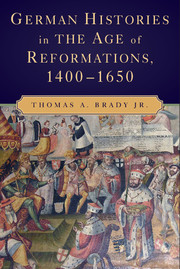Book contents
- Frontmatter
- Contents
- Figures, Maps, and Tables
- Acknowledgments
- A Note on Usages
- Map 1 The Empire in 1547
- Map 2 The Peace of Westphalia, 1648
- Part I The Empire, the German Lands, and Their Peoples
- 1 Reformations in German Histories
- 2 Shapes of the German Lands
- 3 Temporal Estates – Farmers, Traders, Fighters
- 4 The Church and the Faith
- Part II Reform of the Empire and the Church, 1400–1520
- Part III Church, Reformations, and Empire, 1520–1576
- Part IV Confessions, Empire, and War, 1576–1650
- Appendix
- Glossary
- Bibliography
- Index
1 - Reformations in German Histories
Published online by Cambridge University Press: 05 June 2012
- Frontmatter
- Contents
- Figures, Maps, and Tables
- Acknowledgments
- A Note on Usages
- Map 1 The Empire in 1547
- Map 2 The Peace of Westphalia, 1648
- Part I The Empire, the German Lands, and Their Peoples
- 1 Reformations in German Histories
- 2 Shapes of the German Lands
- 3 Temporal Estates – Farmers, Traders, Fighters
- 4 The Church and the Faith
- Part II Reform of the Empire and the Church, 1400–1520
- Part III Church, Reformations, and Empire, 1520–1576
- Part IV Confessions, Empire, and War, 1576–1650
- Appendix
- Glossary
- Bibliography
- Index
Summary
Liberty is characteristic of the Germans.
Justus LipsiusMen make their own history, but they do not make it just as they please; they do not make it under circumstances chosen by themselves, but under circumstances directly encountered, given and transmitted from the past. The tradition of all the dead generations weighs like a nightmare on the brain of the living.
Karl MarxIn the beginning was Waterloo. Near that small place south of Brussels on 18 July 1815, the armies of two Protestant kingdoms, Britain and Prussia, joined to crush the polyglot forces of a French power thought in Protestant lands to represent both Revolution and Rome. Within a generation Protestants were celebrating their sixteenth-century reformation as the dawn of a modern age of unprecedented prosperity, freedom, and knowledge. In 1827, with Napoleon only six years dead, the Scottish polymath Thomas Carlyle (1795–1881) named the Germans the creators of three keys to modern civilization: the printing press, gunpowder, and Protestantism. (He was right about two of the three.) In 1845–47 his exact contemporary, the German historian Leopold von Ranke (1795–1886), published his German History in the Age of the Reformation (1845–47), the single most influential modern interpretation of the German Protestant reformation. Ranke's vision, contrary to much received opinion, was not national but European. “It is one of the greatest coincidences presented by the history of the world,” he wrote,
that at the moment in which the prospect of exercising dominion over the other hemisphere opened to the Romano-Germanic nations of the Latin church, a religious movement began, the object of which was to restore the purity of revelation. Whilst other nations were busied in the conquest of distant lands, Germany, which had little share in those enterprises, undertook this mighty task.
- Type
- Chapter
- Information
- Publisher: Cambridge University PressPrint publication year: 2009

